Revisiting Linux Part 1: A Look at Ubuntu 8.04
by Ryan Smith on August 26, 2009 12:00 AM EST- Posted in
- Linux
CPU Benchmarks
We’ll start our short look at Ubuntu’s performance with our CPU intensive benchmarks. Up first is SuperPi, a single-threaded pi-calculating benchmark. Here we time how long it takes to calculate Pi to 1 million digits.
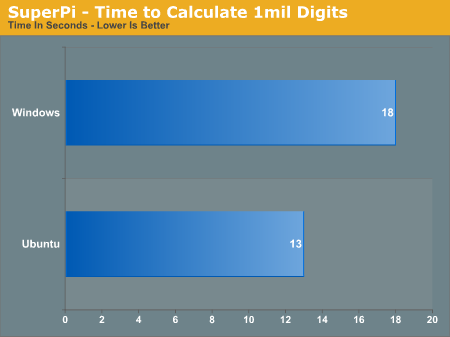
We ran this test several times more than usual just to make sure we weren’t seeing any kind of error. The Linux version of SuperPi really is about 30% faster than the Vista version. Keep this in mind, this will be an important point later.
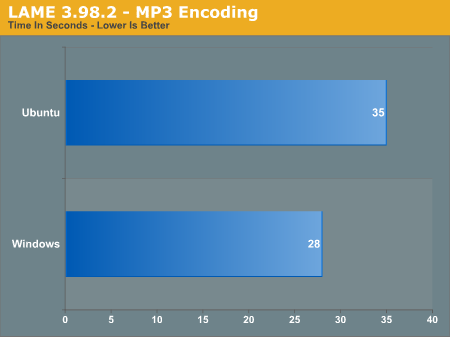
Meanwhile the situation for LAME is inverted. Vista outscores the Linux version by nearly 20%.
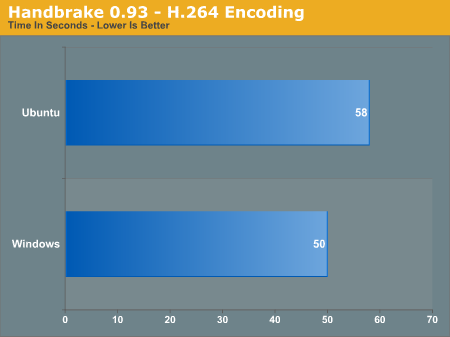
Using the cross-platform X264-based Handbreak for our video encoding test, Vista once again pulls ahead of Linux.
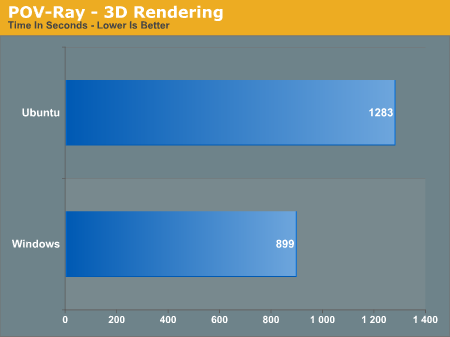
Once more Vista is ahead by a large margin.
From what we can tell, there’s little-if-any innate performance advantage to Vista or Linux in these benchmarks. Our working theory is that the performance difference comes down to the compiler used. Many Linux applications are compiled with GCC, while for Windows it’s either the Visual Studio compiler, or Intel’s own compiler (which is also available for Linux). There’s also a matter of compiler settings, as we saw in our quick breakout of Firefox benchmarks.
Meanwhile SuperPi uses a lot of hand-rolled code, although we’re still not sure why it’s outperforming Vista on Linux by as much as it is.
To shed a little more light on this idea of compiler performance, we have a few benchmarks of Windows application performance under Ubuntu through Wine.
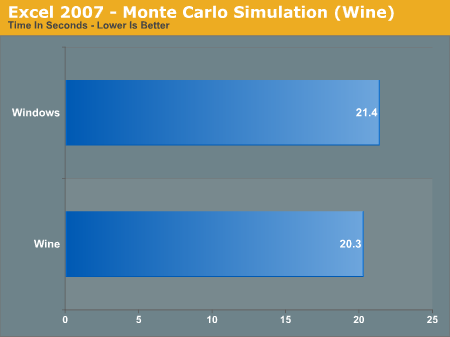
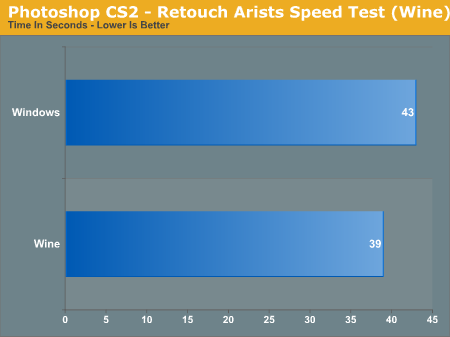
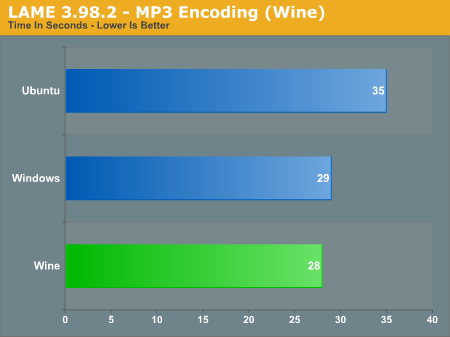
Here we see a most amazing thing: Ubuntu is outperforming Windows at running Windows applications! As we’ve removed the influence of compilers the Photoshop results are particularly interesting. From what we can tell it’s normally as fast under Linux as it is Vista, however there seems to be a short gap of low-CPU usage when running it under Vista that doesn’t occur when running it under Ubuntu. As a result Ubuntu finishes a few seconds earlier.
There are a number of conditional cases that mean that applications running under Wine don’t always match or beat Windows performance, but in our tests there’s no performance hit to using Wine to run Windows applications.
These results also lend a great deal of support to the idea that there’s a significant difference in performance between the two operating systems due to their compilers. This goes particularly for the LAME benchmark, where the performance gap melts away under Wine. This is something we’re going to have to look in to in the future.










195 Comments
View All Comments
Guspaz - Wednesday, August 26, 2009 - link
"Not that it would necessarily be of much use, the last time I saw any statistics for instant messaging network usage, the vast majority of North American users were on AOL’s AIM network."IM use is highly regionalized. As such, AIM is clearly the dominant IM in the USA. However, Canada is dominated by MSN Messenger, and has been for many years (most of us migrated from ICQ to MSN around the release of Windows XP, I believe, due to the bundling of then Windows Messenger).
So, if Canada is dominated by MSN, while I can't speak for Mexico, it's misleading to claim that "the vast majority of North American users". As a Canadian, I can't think of anybody I know in person that uses AIM. They all use MSN or Google Talk without exception.
Aclough - Wednesday, August 26, 2009 - link
For myself, the thing that most bugs me when I have to go back to Windows is all the missing features from the window manager. I've come to rely on having multiple workspaces on my desktop, but I can adjust to having just one fairly easily when I'm not working on a lot of different stuff at once. What really bugs me, though, is how much more effort it takes to move or resize windows in Windows. On Linux I can press ALT and then click anywhere on the window, but with Windows I have to carefully click the title bar or the very edge of the window and that takes a noticeably longer time once you're used to doing things differently.Oh, and I find that the Linux scheduler seems to be noticeably better than the Windows one in preserving responsiveness when the system is under load.
fumacapena - Wednesday, August 26, 2009 - link
Great article!How about some benchmarks of "minimal" distros (like Puppy, Tine Core, ...)??
I like the idea of "ressurect" an old PC, but I would like to see benchmarks in Quad Cores, i7 too!
Anandtech is great, Bench(beta) is awesome!!
(sorry by bad english)
Thanks
InGraphite - Wednesday, August 26, 2009 - link
A few months ago most major trackers unbanned Transmission, but it still doesn't seem to be universally accepted on private trackers.I remember offhand (I could be wrong) that the main gripe was due to the fact it made excessive queries and thus flooded trackers with requests, or had the ability to.
chomlee - Wednesday, August 26, 2009 - link
I think you really need to mention the big picture here.I myself just tried Ubuntu for the first time 2 months ago and although I will admit that I have spent up to 8 hours trying to figure out how to install a specific program (before I found out there was a way to get the package manager to find the install), and I wanted to smash my computer at times. Now that I have learned quite a bit more, I realized that the few things I have installed worked great and flawlessly.
Anyhow back to the big picture. I can understand some of your concerns with how the OS will work with specific programs but what I have found is that most people I know use their computers for 2 things email and web browsing. Most of these people are constantly having problems with the system running too slow and cant seem to get rid of hidden viruses/malware. So I think that those people could easily be much happier with a simple OS like Ubuntu just for email and web browsing (And I would get a heck of alot of less calls from my dad asking my why his computer is running too slow). Lets also not forget that everything is moving to be browser compatible (like you mentioned).
Also, for people like myself, I use my Ubuntu system for a file server as well as a media center (XBMC is Awesome).
So, yes, for burning DVDs/CDs/Playing Games/Microsoft Office, I see no reason why you wouldn't use windows, but I think 95% of the users would be perfectly fine with ubuntu which is something that Mr Bill would not be very happy about when the public realizes this.
Keno - Thursday, August 27, 2009 - link
I think you have missed one small but important part.I am Ubuntu user since 8.04. I came to Linux because of the constant treat of viruses.
Last month I have installed 7 and it is very user friendly and I think it is very user frinedly but after Avira Antivir got crashed by virus I installed Kaspersky INternet security 2010. then it took almost twice as long to boot. Then I gladly returned to Ubuntu 9.04. Because MIcrosoft can not exist without Antivirus I think you should do some real benchmarking and test windows WITH Antivirus.
On Ubuntu I have ClamWin just in case i get some files from Windows users:)
Thanks
ioannis - Wednesday, August 26, 2009 - link
just wanted to point out that you can install software under the LiveCD. Of course it does not install on the hard drive. It remains on a ram-drive, so when you reboot, it's gone. It's still useful, if you wish to test out some package or perform some task with a tool not installed by default on the LiveCDstrikeback03 - Wednesday, August 26, 2009 - link
Even more useful (and not mentioned) is that Ubuntu can easily run off a flash drive, and more recent versions even include a GUI tool for installing it to one. Then all installs and other changes are saved from session to session, and everything runs much more quickly than the LiveCD.Mr Pearce - Wednesday, August 26, 2009 - link
It would be great if you could do more articles on compiler and especially driver performance differences. That was the most interesting part of this article.Ryan Smith - Wednesday, August 26, 2009 - link
This is what Part 2 will look at. I can compile some stuff by hand to see if it closes the Windows/Ubuntu gap, and I have plenty of video cards on hand to test what I can when it comes to graphics.